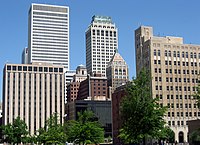Tulsa is the second-largest city in the state of Oklahoma and 48th-largest in the United States. With an estimated population of 382,872 in 2006, it is the principal municipality of the Tulsa Metropolitan Statistical Area, a region of 897,752 residents projected to reach one million between 2010 and 2012.
Tulsa was first settled in the 1830s by the Creek Native American tribe. In 1921, it was the site of the infamous Tulsa Race Riot, one of the largest and most destructive acts of racial violence in the history of the United States. For most of the 20th century, the city held the nickname "Oil Capital of the World" and played a major role as one of the most important hubs for the American oil industry. Tulsa has been credited as the birthplace of U.S. Route 66 and the home of Western Swing music.
Once heavily dependent on the oil industry, economic downturn and subsequent diversification efforts created an economic base in the energy, finance, aviation, telecommunications and technology sectors. The Tulsa Port of Catoosa, at the head of the McClellan-Kerr Arkansas River Navigation System, is the most inland riverport in the U.S. with access to international waterways. Two institutions of higher education within the city operate at the NCAA Division I level, Oral Roberts University and the University of Tulsa.
